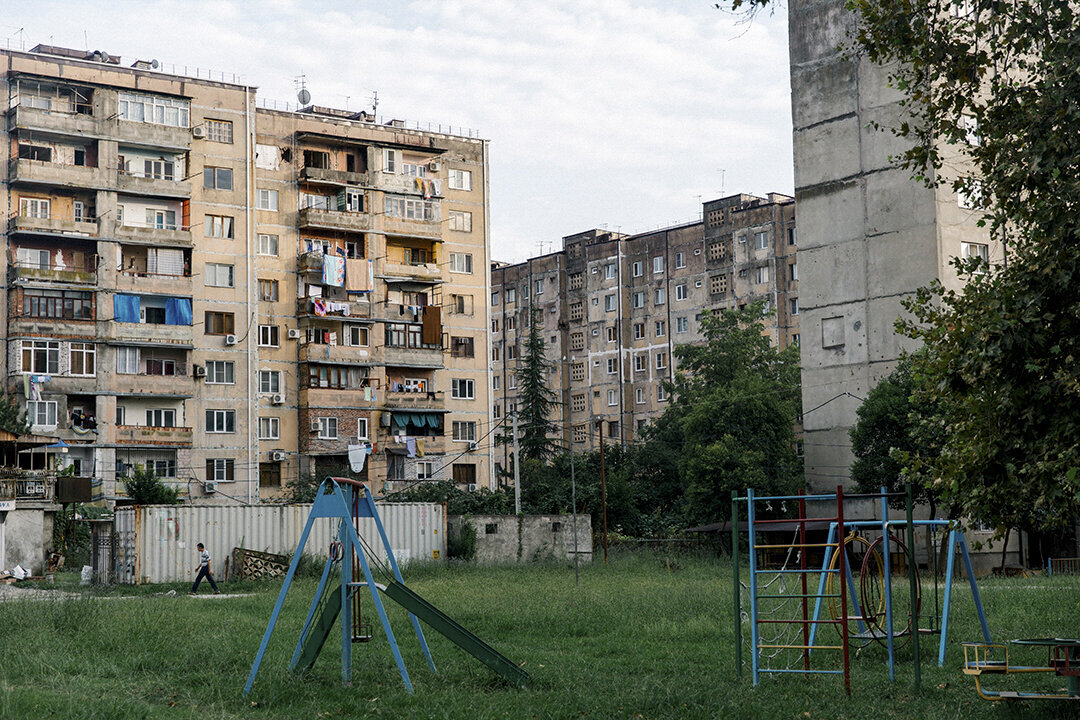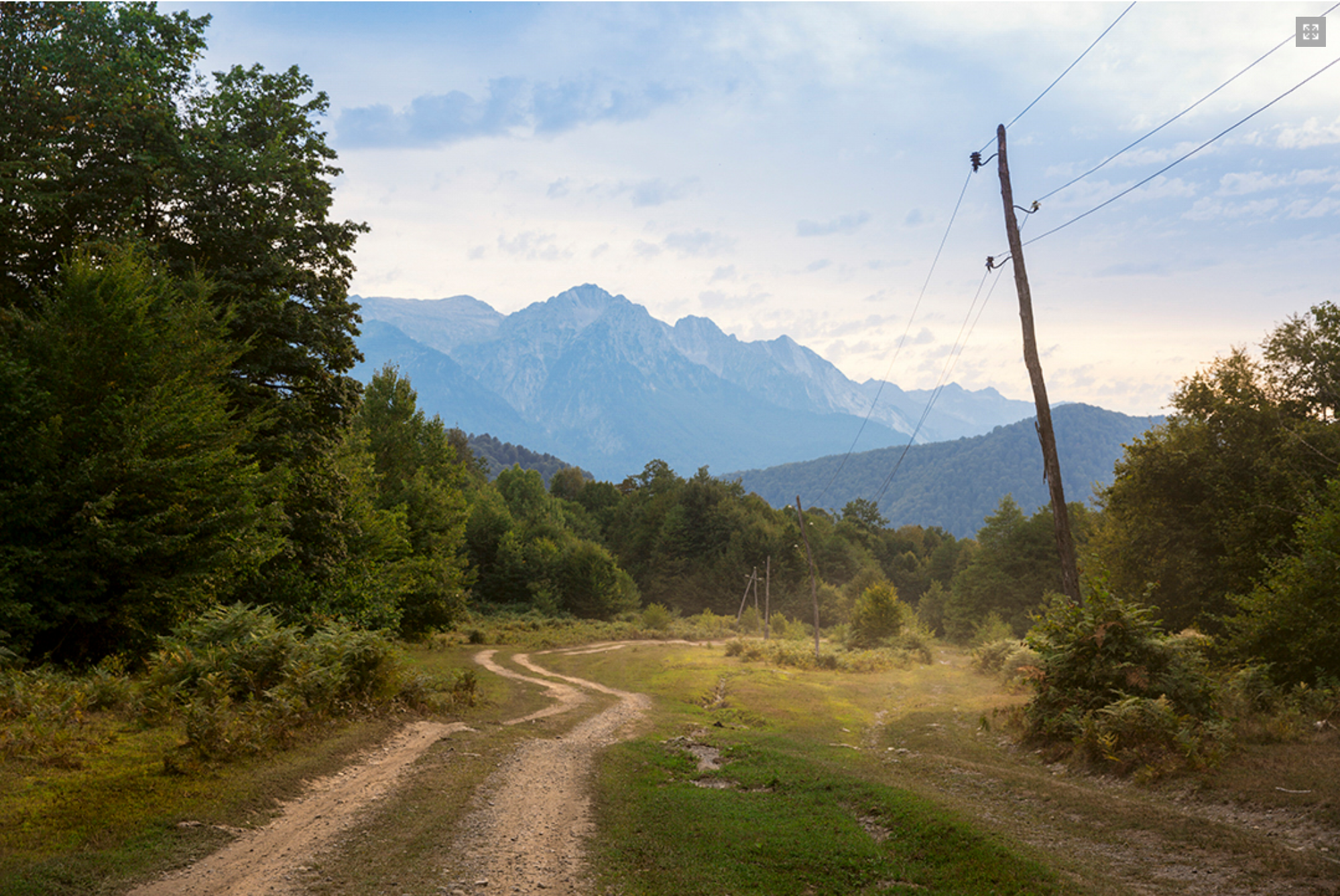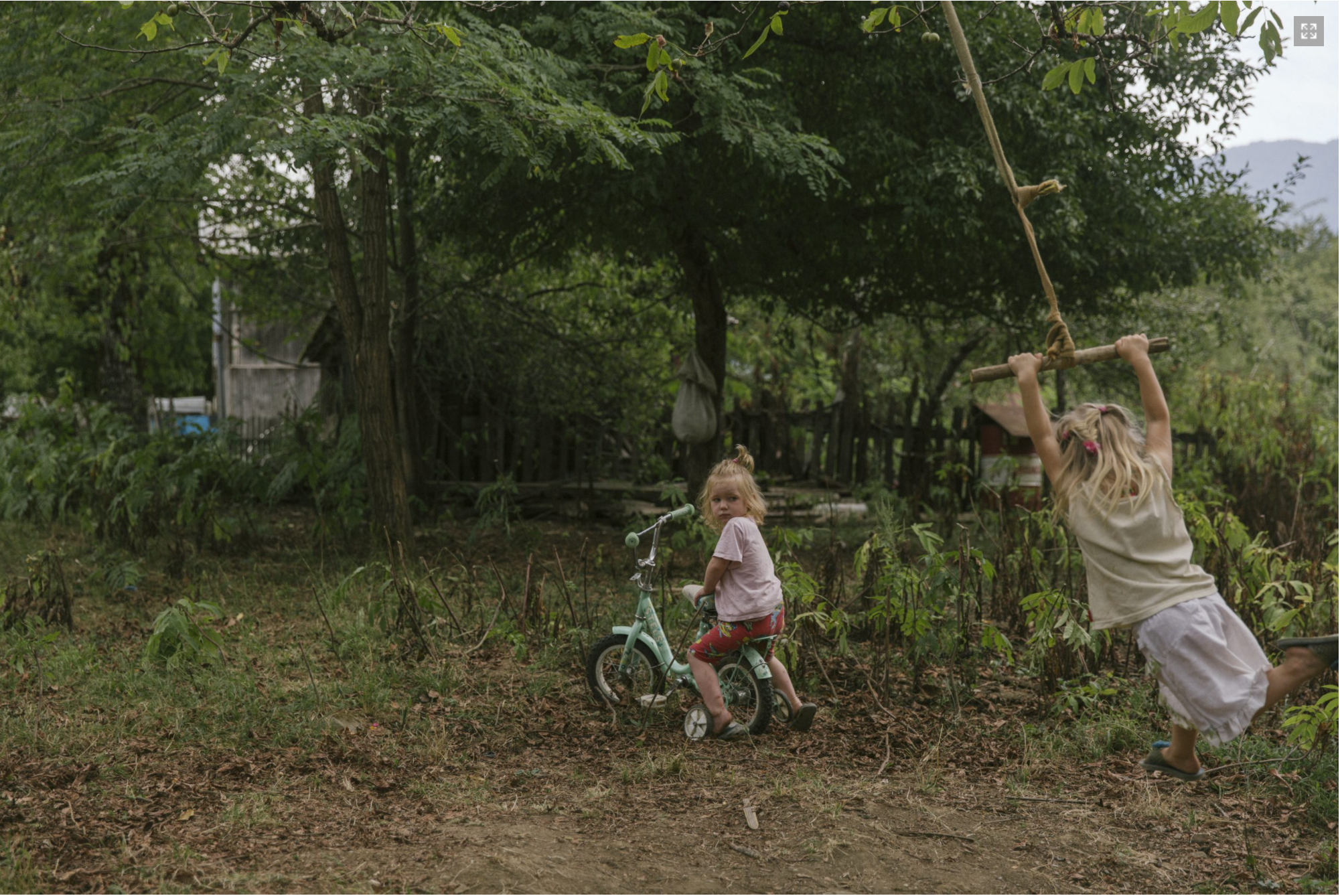The Soul of Ksenia Kuleshova
In the space of less than seven years, Russian born Ksenia Kuleshova has become one of her generation’s up and coming young photographers in the field of photojournalism and documentary photography. Her work has been published in the Wall Street Journal, the New York Times Lens Blog, and DIE ZEIT, a German national weekly newspaper, among others, and she has received numerous scholarships and awards – not the least of which was the first-ever LHSA Photography Grant in 2017. Amid the accolades and accomplishments, what is equally extraordinary is the journey that has brought Ksenia to this juncture in her young career. Her story embodies the very soul and self-determination of an artist who is resolute in her aspirations.
Ksenia was born next to the Oka River in the small merchant town of Kaluga, approximately 120 miles southwest of Moscow. Her father, a lawyer, was in the military and her mother, a chemical engineer, was a stay-at-home wife. After high school, she graduated from the Moscow Aviation Institute with a degree in public relations. She worked on the agency side during and after college but came to the realization that a career in public relations was not for her.
In a bold decision, and without any prior knowledge or experience, Ksenia decided to completely change course and become a photographer. To make things even more interesting, she set her eyes on studying at the University of Applied Sciences and Arts in Hanover, Germany. Any good friend might have suggested that her aspirations were a bit too lofty, but sitting alone in a bar in Moscow one evening, she mapped out a plan to apply to the University, learn an entirely new language, and set out to work on her dreams.
Entering her chosen university had its inevitable roadblocks. After emailing two of the professors to meet with them, they said it would be impossible for her to enter their photojournalism program. Her portfolio was weak and she couldn’t speak a word of German. They encouraged her to take a few years to develop her work and try again.
For Ksenia, this was like fanning the fire in her belly. “I was thankful for this honest assessment,” she said, “but at the same time it made me angry and motivated me. I started an intensive German course in August 2010. At the same time, I wrote to photographers who had graduated from the program in Hanover and asked them for advice on my portfolio. One of them, Mitya Kushelevich, responded to my request. He was very honest. Sometimes, I cried because his critiques could be really tough, but I knew that they would help me.”
Mitya Kushelevich, a noted photographer and art director in Russia and Germany, became an important mentor and was immediately impressed with her. “What made Ksenia different from the others was not the quality of her pictures, but the sheer determination to listen to advice and become better. She improved at a dazzling pace,” he said.
Kushelevich encouraged Ksenia to take on projects that challenged her to learn about herself and to understand what a photographer’s career path was like. Shortly after their initial meeting, Ksenia photographed two projects in a matter of months. One was at a remote rehabilitation center for drug and alcohol addicts under extremely difficult conditions. Her hubris astounded him. “I was completely blown away by the amount of courage Ksenia had to take on such a topic, not only as a young photographer but also as a young woman barely past her teenage years.”
While she was learning German, Ksenia was also finishing her diploma in Moscow. She quit her PR job to work as a waitress at the Moscow Airport to help save money for her first year in Germany. Then in 2011, she moved to Germany, though she had not taken the required language proficiency test and was not completely sure that she could start the program in Hanover. As fate would have it, or more precisely, as Ksenia would have it, she passed the test and was accepted into the photojournalism school.
Rolf Nobel, the founder of the photojournalism school in Hanover and Ksenia’s professor, was equally impressed with her commitment and passion. “She is equipped with a fundamental talent to win people for her stories and having a huge creative competence. Once Ksenia chooses a path she will not give up. It doesn’t matter if it gets difficult.” With Nobel as her professor, she has since completed her bachelor’s degree at the University and is currently working on a master’s degree in photojournalism at the University of Applied Sciences and Arts Dortmund.
The purity of burning desire that is part of Ksenia’s DNA is perhaps the perfect example that talent isn’t everything, and that doing the work is as, or even more, important. Her ability to transform her life into a profession that has garnered such recent recognition as winner of the PDN Photo Annual Prize 2017 (student category) the 2017 Tokyo Photo competition and most recently, acceptance into the 2018 New York Portfolio Review, is a testament to her work ethic and talent. Kushelevich best describes why Ksenia is special. “Her relentless work on herself and the will to listen and learn have made her the young aspiring professional she is now. But her photography is not only about work ethic, it’s about the way she sees people. She has a gift of not judging people but accepting them the way they are. Her pictures don’t choose sides or follow an agenda; they are never condescending. Her camera is not above the people, but always with them. There is also a slight touch of Russian-esque nostalgia throughout her pictures that make them stand out, a certain warmth and humble humanity.”
Today, Ksenia continues to push boundaries in an unyielding pursuit to improve her work and herself as an artist. There is no doubt that she has a bright and promising future, if for no other reason than she has the sheer force of will to make it happen. The LHSA looks forward to her development and is proud to have a hand in her remarkable story.
R E C E N T LY, I SAT D O W N W I T H K S E N I A (by way of an email exchange) to learn more about her and the Abkhazia Project that won her the LHSA Photography Grant.
RR: You grew up in a small town in Russia. Tell me about your childhood.
KSENIA: I was a very naughty and curious child, obstinate and resilient, and I couldn’t just sit still. My mother used to cry sometimes when I was little because I took all her energy. But I’m grateful that my parents knew this was how I discovered the world. I was passionate about trying everything. I was always very responsible, determined and hard working. Maybe because I’m from a military family and the worst thing for me was to let down my parents or my own expectations. It was important to me that my parents were proud of me. I never wanted to give up my goals and learned that I could do things that I found important to me. Not much has changed. I’m still a responsible, hardworking dreamer, who tries to save this curious and crazy child inside. Sometimes, I suffer from my perfectionism, but I’m working on it and struggling against my fears. Fears are just in our mind; the soul doesn’t know fear.
RR: You are currently working on a master’s in photography. How does your background inform your work?
KSENIA: It’s been six years since I moved to Germany, and these years have been an important chapter of my life. My experience in Europe, all of the difficulties I had to go through and all the talented and outstanding people who I had the chance to meet have influenced me. I’ve learned a lot, first as a human, a person. Now my vision combines different cultures and I’m so thankful for it. This diversity is very inspirational. The fact that I speak Russian and understand what makes Russians tick gives me a huge opportunity to access this world and to document it. It isn’t just about knowing the language; it’s about having the same cultural background.
RR: It seems that one day you simply decided to become a photographer without having any prior experience. What led you to choose photography?
KSENIA: After I realized that a career in public relations wasn’t for me, I wanted to change my life. I was always interested in photography, but I thought of it as a hobby and not a profession or lifework. So, it was my curiosity to try something new. I bought my first camera at the age of 21 when I was studying and working in Moscow. While I was working on my portfolio, the first story I did was about students from Malaysia, who lived in the same building as I did. The second story was about a slaughterhouse. The third story was about drug and alcohol addicts.
RR: If you had to describe your photography at this point in your career, what is it that you want to express through your images? What inspires you?
KSENIA: I like to describe myself as a lyrical documentary photographer. I’m drawn to the strength of people’s character. Their passion for life and love inspires me. I’m looking for real feelings, sincere and pure emotions. I want my stories to express adventure and discovery. Something that is beyond words, something metaphorical. I can describe my philosophy about life and photography as a way of discovering, developing my personality, always searching for new horizons. I am always open to my protagonists and they are open to me. That is very important for me. I learn a lot while working on a story and I want to share this. Brutal and cruel facts are so often discussed. There should be more beautiful stories about happiness and harmony. It’s a paradox. It’s very difficult for people to value good things.”
RR: You are the winner of the first-ever Leica Society Grant for $5000! What was that like for you?
KSENIA: It’s difficult to put into words my first reaction when I got this incredible news. When I received your email and read the first sentence, I started to cry. I can be quite emotional and this was a moment when I was so happy and couldn’t believe that I had won. So, when I replied that I would accept the award, it was with many exclamation marks.
RR: You were chosen on the merits of the work you submitted on your Abkhazia Project. How did the project come to you?
KSENIA: I wanted to start a long-term project, which is connected with Russia and the Russian language. I heard about Abkhazia from my parents, who vacationed there before the terrible Georgian-Abkhazian war. It was once one of the most beloved tourist regions of the Russian Empire and later of the Soviet Union. It’s now a lost place on the world map. The people there live in a bubble, trying to exist within the uncertainty, within a system that doesn’t have a future and doesn’t seek one. I found all these political and social issues interesting and decided to begin the project. I began photographing there in 2015 as an undergraduate and have returned three times since then. Abkhazia means “land of the soul.” My aim was not to concentrate on the war or the ruined buildings. I wanted to find its soul. I followed my intuition and trusted the people there because they trusted me. I asked people to show me their favorite places and to take me with them to events that were important to them. Building the relationships and trust before taking pictures was the only thing that guided me.
RR: How do you plan to use the money from the grant to further the Abkhazia Project?
KSENIA: In order to focus on and finish this project, I need help covering my expenses on the next trip and production of the project into a book. While working on the Abkhazia project, I discovered an ability of people to enjoy the moment, value the happiness and joy of everyday life despite their ongoing conflict, harsh economic situation and political isolation. I think it is important to distribute a publication widely to share this feeling, to let more people know about this beautiful, exotic, confusing and encapsulated country.
I’m planning a visit to Abkhazia again in the Spring of 2018 and produce the first photo book drafts by summer 2018. I want to see this photo book in a wide distribution and will work for it. The grant money will help me to fund production expenses and I’m very happy that the LHSA is supporting my project.
RR: You made a short video to thank the LHSA for the photography grant, and in it you mentioned that you believe in the power of strong wishes and working on your dreams. What does that mean for you?
KSENIA: I love to set goals and achieve them. I believe strongly that we have to try all avenues and if that doesn’t work, then we know that we did all we could. Dreams come true, I know this for sure. You dream, you set the goal, and work on that dream. It’s clear that life has its own plan for us; however, life’s challenges are so inspiring, so it’s a great opportunity to learn and grow! Maybe I’m just trying to see all of life’s difficulties in a positive light. It’s not so easy to do all the time, but it’s worth trying.
Abkhazia, Eshera, 30/06/2017. In accordance with traditional rituals after a person passes away, his relatives put clothes and his overturned portrait on a bed. The bed sheets aren’t be changed for a whole year.
Sadya Sabekiya, 7 at the time, in her room holding a popular Russian Cheburashka toy in her hands. Sukhumi, 2016.
Hegumen Ignatiy, at St. John Chrysostom’s Monastery in Kamani village.
Abkhazia, Eshera, 2017. Potatoes are stored on a floor in order for them to stay dry.
RR: As a talented and upcoming young photographer, you have already won several impressive and notable awards. What advice do you have for other young photographers?
KSENIA: It might sound like a cliché, but you have to believe in yourself and your projects. Who else, if not you? You have to stand up for your story, give your heart to your heroes and your pictures will show your dedication and message.
Don’t hesitate to ask for advice or help. The question doesn’t cost you anything but can make you better. I do believe in the power of experience, exchange, and helping each other. In my mind, I believe that a photographer needs to be influenced by totally different fields and people of other professions. But it’s also necessary not to forget to spend time alone with yourself, trying to find the balance between your social life and personal growth.
Make things happen for yourself! Build your community, build relationships, and show your best work! Less is more!
Ksenia’s Five Tips for Finding, Beginning & Finishing a Project
Find a topic you care about. If the story touches your heart and you are really passionate about showing it, the story will touch other people, too.
Research the topic, but be open and ready to change your plan. Be spontaneous. Be brave. Follow your intuition.
Build relationships and be honest with your heroes (subjects).
Edit. Don’t show everything, think about how you want to present yourself and your work.
Share your work and participate in the photo competitions. Be ready to continue the story, even if you think the project is finished.








